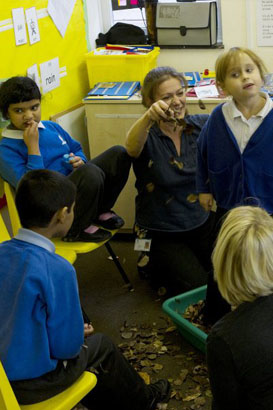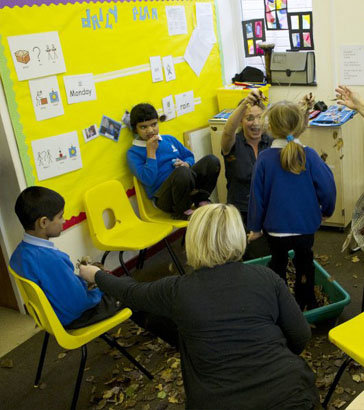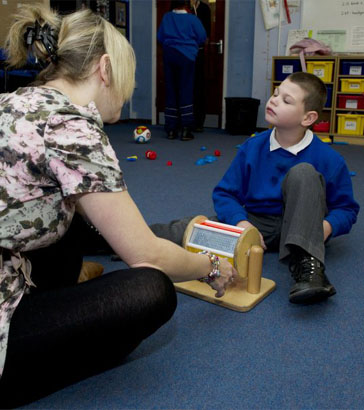Sibs is the only UK charity representing the needs of siblings of disabled people. Siblings have a lifelong need for information,
they often experience social and emotional isolation, and have to cope with difficult situations. They also want to have
positive relationships with their disabled brothers and sisters and to be able to choose the role they play in future care.
There are over half a million young siblings and over a million adult siblings in the UK.
www.sibs.org.uk
SIBS resources include:
- Information for siblings.
- Workshops for siblings.
- Workshops for parents.
- Telephone and email support service for siblings and parents.
- Groups for siblings (child and adult).
- Training (e.g. for adults, schools) on how to run groups for siblings.

SIBS offers a range of groups for siblings of different ages. One of these is based on the Sibshop model developed by Don Meyer in the USA.
The Sibshop model provides siblings of children with special needs with opportunities:
- To meet other siblings in a relaxed, recreational setting.
- To discuss common joys and concerns.
- To learn how others handle situations with their sibling with special needs.
- To learn more about the implications of their sibling's special needs.
Also, Sibshops provide parents and professionals with opportunities to learn more about concerns and opportunities frequently experienced by other siblings.
'Sibshops are celebrations of the many contributions made by siblings of kids with special needs. Sibshops acknowledge that being the sibling of someone with special needs can be good, not-so good, and for many somewhere in between. They reflect a belief that brothers and sisters have much to offer one another--when given a chance. The Sibshop model intersperses information and discussion activities with games designed to be unique, off-beat, and appealing to a wide ability range.'
'They provide lively opportunities for brothers and sisters of children with learning disabilities to obtain peer support
and education within a recreational context.'
Meyer and Vadasy, 1994

Sibshops are best facilitated by a team of service providers and adult siblings of people with special needs who:
- Are knowledgeable about the disabilities or illness represented.
- Possess a sense of humour and play.
- Enjoy the company of children.
- Respect siblings' expertise about life with a sibling with special needs.
Sibshops are run according to need and resources. For example, they may be offered in a series (e.g.five Sibshops, meeting monthly), or as stand-alone events (e.g. bimonthly meetings with separate registrations); some are held weekly, monthly, bimonthly or even yearly.

Thirty siblings (ages 18-34) who had attended Sibshops and since left were surveyed to assess the impact for siblings of attending Sibshops (Johnson and Sandall, 2005):
- Over 90% of the respondents said Sibshops had a positive effect on the feelings they had for their siblings.
- Sibshops taught coping strategies to over two-thirds of respondents.
- 75% reported that Sibshops affected their adult lives.
- 94% said they would recommend Sibshops to others.

'...we have long contended that the biggest beneficiaries of Sibshops are likely to be the sibs who have disabilities.
If we support typically-developing sibs as they grow up, we increase the chances their brothers and sisters will elect to
remain lovingly involved as adults.'
The Sibling Support Project
Watch this video, in which Don Meyer explains some issues for siblings of people with disabilities and shows examples of
Sibshops.
Using the example schedule below, and activities shown devise 2 activities which could be used with siblings to allow them
to talk about their experiences in a sensitive, but fun way.

Johnson, A.B. and Sandall, S. (2005) Sibshops: A follow-up of participants of a sibling support program, Seattle: University of Washington.
Meyer, D.J. and Vadasy, P.F. (1994) Sibshops: Workshops for siblings of children with special needs, Baltimore: Paul H. Brookes.